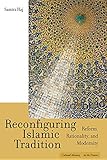Reconfiguring Islamic tradition : reform, rationality, and modernity / Samira Haj.
Material type: TextSeries: Cultural memory in the presentPublication details: Stanford, Calif. : Stanford University Press, ©2009.Description: 1 online resource (xii, 284 pages)Content type:
TextSeries: Cultural memory in the presentPublication details: Stanford, Calif. : Stanford University Press, ©2009.Description: 1 online resource (xii, 284 pages)Content type: - 9780804769754
- 0804769753
- Muḥammad ibn ʻAbd al-Wahhāb, 1703 or 1704-1792
- Muḥammad ʻAbduh, 1849-1905
- Muḥammad ʻAbduh, 1849-1905
- Muḥammad ibn ʻAbd al-Wahhāb, 1703 or 1704-1792
- Muḥammad Ibn-ʻAbd-al-Wahhāb
- ʻAbduh, Muḥammad
- Islamic modernism
- Islamic renewal
- Faith and reason -- Islam
- Islamic philosophy -- History
- Modernisme islamique
- Renouveau islamique
- Islam et raison
- Philosophie islamique -- Histoire
- RELIGION -- Islam -- General
- Faith and reason -- Islam
- Islamic modernism
- Islamic philosophy
- Islamic renewal
- Islam
- Reform
- 297.8 22
- BP166.14.M63 H33 2009eb
- online - EBSCO
| Item type | Current library | Call number | URL | Status | Notes | Barcode | |
|---|---|---|---|---|---|---|---|
 eBook
eBook
|
Biblioteca "Angelicum" Pont. Univ. S.Tommaso d'Aquino Nuvola online | online - EBSCO (Browse shelf(Opens below)) | Online access | Not for loan (Accesso limitato) | Accesso per gli utenti autorizzati / Access for authorized users | (ebsco)297611 |
Includes bibliographical references and index.
The Islamic reform tradition -- Rethinking Muhammad ibn Abdul Wahhab -- Islamic reconfiguration of colonial modernity -- Governable Muslim subjects -- Love and marriage -- Conclusion.
Print version record.
"Samira Raj conceptualizes Islam through a close reading of two Muslim reformers - Muhammad ibn 'Abdul Wahhah (1703-1787) and Muhammad 'Abduh (1849-1905) - each representative of a distinct trend, chronological as well as philosophical, in modern Islam. Their works are examined primarily through the prism of two conceptual questions: the idea of the modern and the formation of a Muslim subject. Approaching Islam through the works of these two Muslims, the author illuminates aspects of Islamic modernity that have been obscured and problematizes assumptions founded on the oppositional dichotomies of modern/traditional, secular/sacred, and liberal/fundamentalist. The book explores the notions of the community-society and the subject's location within it to demonstrate how Muslims in different historical contexts responded differently to theological and practical questions. This knowledge will help us better understand the conflicts currently unfolding in parts of the Arab world"--Jacket.
English.


